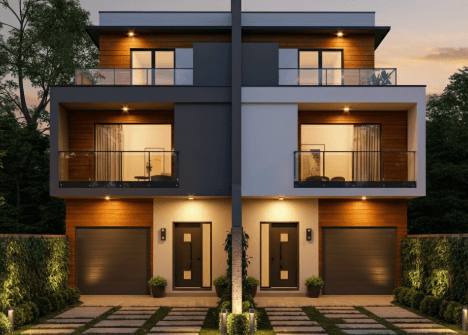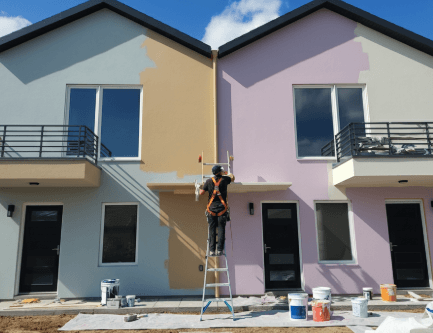What is the cheapest duplex to build? The cheapest duplex to build typically varies from $150 to $200 per square foot, influenced by location, design, and materials. This detailed guide will walk you through finding the cheapest duplex to build by shedding light on cost-effective solutions, strategies, and tips to ensure that your investment yields maximum returns without breaking the bank. Expect to learn about cost-effective building materials, design choices, and pro tips that will allow you to build a duplex without compromising on quality or aesthetics.
In the quest for the cheapest duplex to build, real estate investors Steve Daria and Joleigh emphasize the importance of smart material choices and strategic site selection. Their knowledge shows that constructing in sparsely populated regions can result in substantial cost savings without compromising quality. By applying practical insights from their successful projects, aspiring homeowners can achieve their construction goals while staying within budget.
Understanding Duplexes
A duplex is a kind of residential building that is divided into two distinct living units, each with its own separate entrance, allowing for independent living spaces within the same structure.
These units can accommodate two separate families or households, making duplexes a versatile choice for various living arrangements.
The design typically includes common walls and shared utilities but ensures privacy for each unit.

Benefits of Building a Duplex
Building a duplex offers several notable advantages, making it a compelling option for many property owners.
Firstly, it can generate rental income from one unit, which can help offset mortgage payments and improve cash flow.
Secondly, duplexes provide flexibility by allowing owners to reside in one unit while renting out the other, offering both personal and financial benefits.
Additionally, duplexes often have higher resale values compared to single-family homes due to their dual-income potential and versatile use.
Factors Affecting Duplex Building Costs
Several elements play a significant role in identifying the cost of building a duplex, and understanding these can help you find the cheapest duplex to build.
Land Costs
The price of land can vary according to its location, with urban areas generally commanding higher prices compared to suburban or rural regions.
Urban plots are often more expensive due to their proximity to amenities and infrastructure, while land in less developed areas can be more affordable.
To save on costs, consider purchasing land in emerging neighborhoods or areas with potential for future development, where prices might still be relatively low but are expected to rise.
Building Materials
The choice of building materials has a crucial role in identifying the overall cost of construction.
Selecting cost-effective yet durable materials can help you stay within budget while ensuring the structural integrity of the building.
Materials like prefabricated panels or reclaimed wood can offer savings compared to traditional options, without sacrificing quality.
Labor Costs
Labor costs can fluctuate based on regional rates and the complexity of the construction project.
In general, hiring experienced but reasonably priced contractors can help you manage expenses more effectively.
It’s also beneficial to obtain multiple quotes and choose professionals who offer a balance of skill and affordability, ensuring a cost-efficient build without compromising on workmanship.
Get Started: Get Your Cash Offer Below…
We are direct land buyers. There are no commissions or fees and no obligation whatsoever. Start below by sharing where your property is and where we can send your offer…
Strategies for Building the Cheapest Duplex
When it comes to constructing a duplex on a budget, several techniques can help you save money.
Opt for a Simple Design
Complex designs with intricate architectural features can significantly drive up costs.
Stick to a simple and functional design to keep expenses in check.
Use Cost-Effective Materials
Look for materials that offer a good balance between cost and durability.
Examples include:
- Concrete blocks instead of bricks
- Vinyl siding instead of wood
- Laminate flooring instead of hardwood
DIY Where Possible
While some aspects of building a duplex require professional expertise, others can be tackled as DIY projects.
Painting, landscaping, and installing fixtures are areas where you can save on labor costs.

Choosing the Right Location
The location or land you choose to build a duplex plays a great role in the overall cost of building a duplex.
Urban vs. Suburban vs. Rural Areas
Urban areas tend to have higher land costs but offer excellent rental income opportunities.
Suburban areas strike a balance between cost and convenience.
Rural areas offer the cheapest land but may have limited rental demand.
Up-and-Coming Neighborhoods
Investing in up-and-coming neighborhoods can be a cost-effective strategy.
These areas often offer lower land prices but have the potential for significant appreciation.
Proximity to Amenities
Choose a location near essential amenities like schools, hospitals, and shopping centers.
This ensures higher rental demand and better resale value.
Cost-Saving Tips
Building a duplex doesn’t have to be prohibitively expensive.
Here are some additional tips to help you find the cheapest duplex to build.
- Hire a Skilled Contractor: A skilled contractor can efficiently oversee the project to ensure adherence to budget and timeline constraints. Get multiple quotes to find the best deal.
- Buy Materials in Bulk: Purchasing materials in volume can lead to significant discounts. Coordinate with your contractor to buy materials in large quantities.
- Apply for Permits Early: Obtaining permits can sometimes cause delays, which can be costly. Apply for necessary permits early to avoid any hold-ups in the construction process.
The Role of Sustainable Practices
Incorporating sustainable practices can further reduce costs and add long-term value to your duplex.
- Energy-Efficient Appliances: Invest in energy-efficient appliances to reduce utility bills. While the initial cost may be higher, the savings over time can be substantial.
- Solar Panels: This can greatly lower electricity expenses. Many regions offer incentives and rebates for using renewable energy sources.
- Sustainable Materials: Using sustainable materials can be both cost-effective and environmentally friendly. Bamboo flooring and recycled steel are excellent options.
Example of a Cost-Effective Duplex Design
To give you an idea of what a budget-friendly duplex might look like, consider the following design features:
- Square or rectangular footprint to minimize exterior wall costs.
- Open floor plan to reduce the need for load-bearing walls.
- Shared amenities like a common laundry room to save on plumbing and electrical work.
Frequently Asked Questions
Explore the most common queries about duplexes.
What is the cheapest building material for a duplex?
Concrete blocks are among the most affordable and durable materials for constructing a duplex.
They offer good insulation and are resistant to fire and pests.
How much does it cost to build a duplex?
The cost can vary widely depending on aspects like location, design, and materials.
On average, building a duplex can range from $100 to $200 per square foot.
Can I finance building a duplex?
Yes, many financial institutions offer loans specifically for building duplexes.
These loans can cover construction costs, and rental income from one of the units can help repay the loan.
Conclusion
Building a duplex can be a cost-effective and rewarding investment if done correctly. By understanding the factors affecting building costs and implementing the strategies discussed, you can find the cheapest duplex to build without compromising on quality. Remember, the key lies in careful planning, choosing the right materials, and staying within budget.
**NOTICE: Please note that the content presented in this post is intended solely for informational and educational purposes. It should not be construed as legal or financial advice or relied upon as a replacement for consultation with a qualified attorney or CPA. For specific guidance on legal or financial matters, readers are encouraged to seek professional assistance from an attorney, CPA, or other appropriate professional regarding the subject matter.
